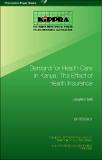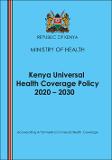| dc.description.abstract | The health of the general population has been a major concern of the Government
of Kenya since independence. There is evidence suggesting that positive health
outcomes can be achieved if health care is made broadly available to the
population during illness episodes. Moreover, it is widely believed that access
to health insurance is one crucial mechanism for enabling all social groups to
obtain care in the event of sickness. However, little evidence exists in Kenya
on effects of health insurance on health status or on demand for health care.
Indeed, substantial uncertainty exists in the literature regarding effects of health
insurance on health and on health care provider choice decisions.
This paper is an attempt to shed light on these issues. It investigates the role of
health insurance on health status, health care utilization, and health care provider
choice, controlling for individual, household, and community characteristics.
Using data from the 2007 Kenya Household Health Expenditure and Utilization
Survey (KHHEUS), the paper estimates probit models of health production and
health care decisions conditional on illness. Further, a multinomial probit model
is used to study the effect of health insurance on health care provider choice... | en |




